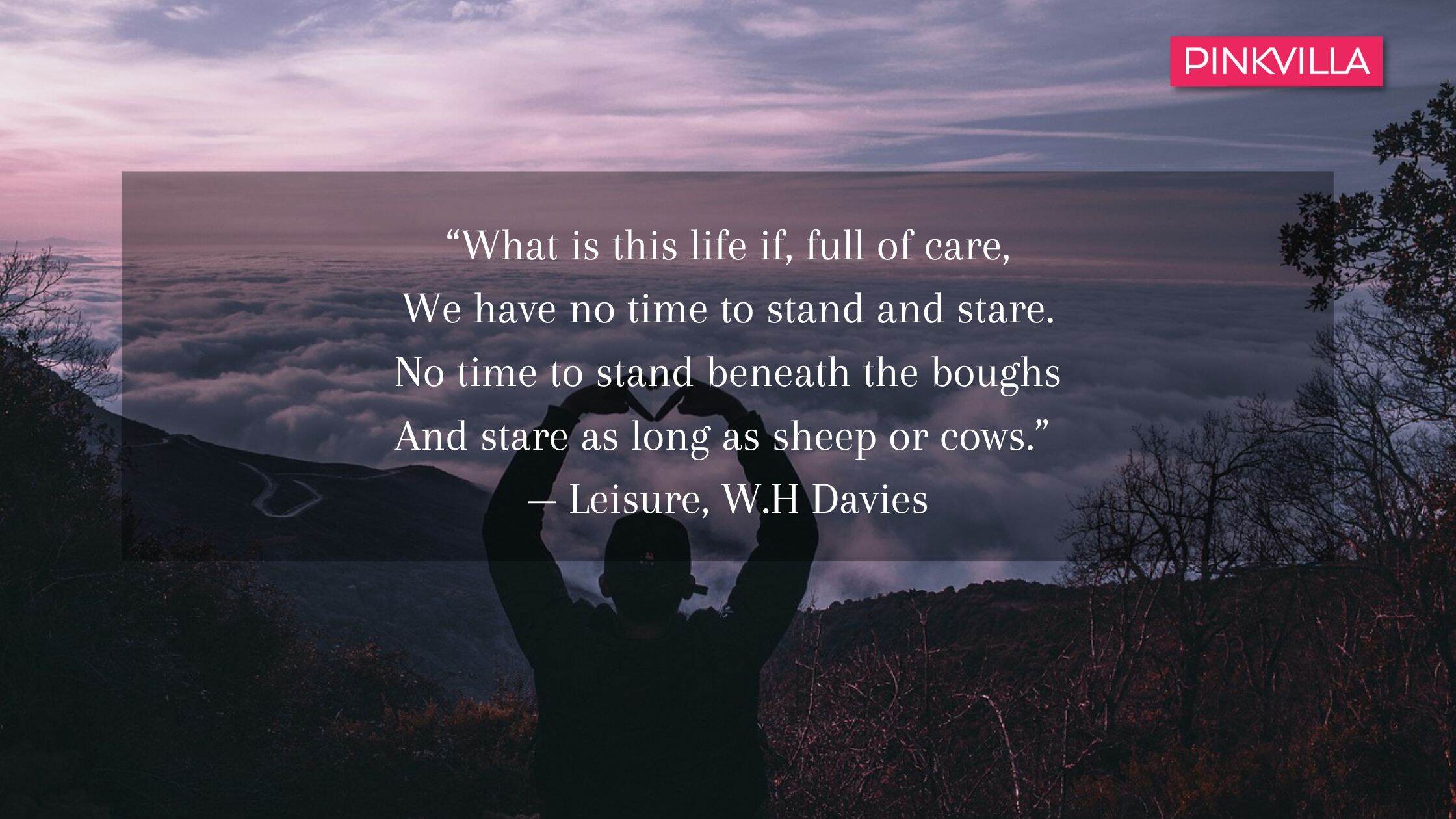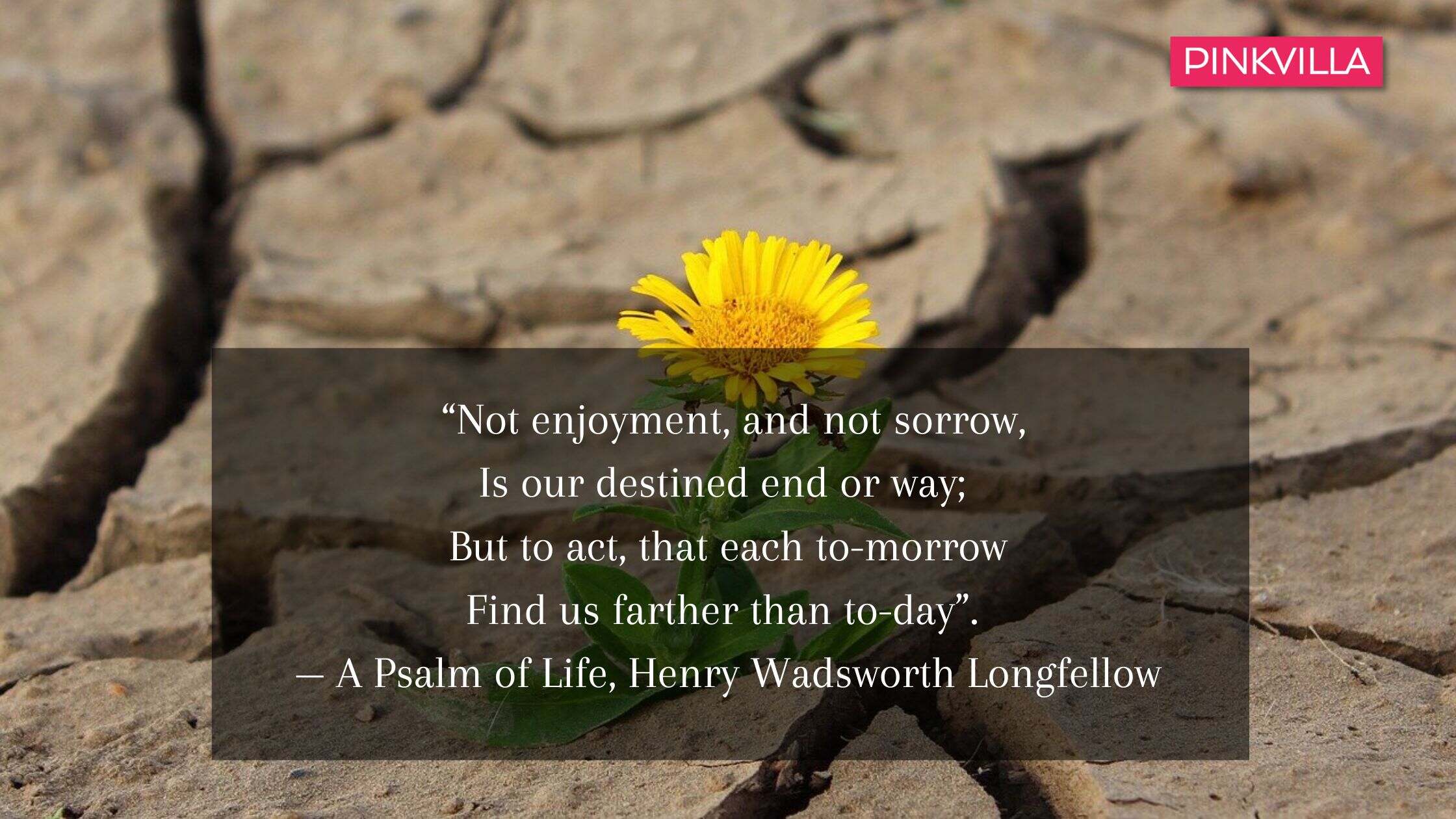27 Poems About Life: Verses That Unveil the Essence of Living
Immerse yourself in verses that resonate with the human experience. Discover insights for navigating the journey of existence through these poems about life.

Navigating life's complexities can be bewildering and challenging. During such moments, poetry's solace and guidance can be invaluable, especially from famous poets like American Poet Robert Frost and unexpected visitor W.H. Davies. Poetry has an uncanny ability to offer a sense of connection, empowerment, and optimism, rekindling our appreciation for life experiences' essence. Here, we've curated a collection of the 27 most remarkable poems about life, embracing an approach to life that spans from the depths of confusion of life to the heights of soaring dreams.
From verses that reflect on the poor life to those that glisten like a stalactite of dreams, the words of poets like Catherine Pulsifer and Christina Rossetti shine in the broad daylight of literary beauty. Each line etched with emotions, each stanza with stories of triumph and struggle, and each phrase that furrows brows with blood and lifts spirits higher, this compilation guarantees you'll discover verses that resonate with your sentiments on even the most dismal day filled with wars of the heart and soul.

This collection brings to life the multifaceted nature of existence, painting portraits of triumphs and tribulations. With each verse resonating with poems about life struggles, you're bound to uncover your favorite poem. Explore this collection of inspiring poems that mirrors your heart's whispers, speaks to your dreams, and accompanies you on this profound journey through the corridors of life.
Short Poems About Life

1. “What is this life if, full of care,
We have no time to stand and stare.
No time to stand beneath the boughs
And stare as long as sheep or cows.” — Leisure, W.H Davies
Amidst a world increasingly entangled in pursuing material ambitions, "Leisure" serves as a poignant call to safeguard moments for nourishing the mind and spirit. The poem initiates with a question tinged with irony, as W.H Davies playfully addresses the rapid pace of modern existence that has eroded our capacity for embracing life's simpler joys (like 'standing' and 'staring' at the natural world). Davies's unwavering faith in the rejuvenating influence of nature becomes evident as he emphasizes the necessity of setting aside time to marvel at its wonders and rejuvenate our souls. Therefore, for those ensnared by an excessive workload, "Leisure" is an essential reminder to pause, recalibrate, and engage in contemplative observation.
2. “O Me! O life! of the questions of these recurring,
Of the endless trains of the faithless, of cities fill’d with the foolish,
Of myself forever reproaching myself, (for who more foolish than I, and who more faithless?)
Of eyes that vainly crave the light, of the objects mean, of the struggle ever renew’d,
Of the poor results of all, of the plodding and sordid crowds I see around me,
Of the empty and useless years of the rest, with the rest me intertwined,
The question, O me! so sad, recurring – What good amid these, O me, O life?” — O Me, O Life!, Walt Whitman
Within Whitman's collection, "O Me! O Life!" emerges as a concise yet revered gem, shedding light on the relentless battle inherent in existence. Following his initial expressions of sorrow, the poet ultimately realizes that life's essence resides within life itself — that our presence, vitality, and capacity to leave an imprint collectively define its significance. While Whitman himself frames this notion quite literally through verse, its metaphorical resonance extends to whatever unique contributions one brings to the forefront.

3. “Not enjoyment, and not sorrow,
Is our destined end or way;
But to act, that each to-morrow
Find us farther than to-day”. — A Psalm of Life, Henry Wadsworth Longfellow
Upon encountering "A Psalm of Life," a spontaneous inclination toward embracing a fulfilling existence may envelop you. The poem vehemently dismisses reducing life to hollow, detached measurements. Instead, it asserts that life transcends being a mere endurance test or a pursuit of constant pleasure. While both anguish and delight are integral to the expedition, the poem champions the concept that life's essence lies in proactive engagement, personal growth, and the relentless endeavor to surpass each preceding day.
4. “And then the day came,
when the risk
to remain tight
in a bud
was more painful
than the risk
it took
to blossom”. — Risk, Anais Nin
Fragmented into eight succinct lines, Anaïs Nin's "Risk" employs the metaphor of a flower to underscore the inevitability that a time will dawn when the discomfort of staying stagnant will eclipse the apprehension of embarking on change. Functioning as a subtle summons, the poem resonates as an unassuming rallying cry, urging a decisive step toward transformation, regardless of the accompanying trepidation.
5. “The woods are lovely, dark, and deep,
But I have promises to keep,
And miles to go before I sleep,
And miles to go before I sleep.” — Stopping by Woods on a Snowy Evening, Robert Frost
Emanating a rhythm akin to a pulsating heartbeat, Frost's renowned masterpiece draws inspiration from the natural world to delve into the internal struggle of humanity torn between the allure of life's splendor and its inherent obligations. Through the deliberate recurrence of the phrase 'and miles to go before I sleep,' Frost deftly encapsulates a universal sensation, a moment etched in the collective human experience—that instance when weariness from life's trials sets in.
Inspirational Poems About Life

6. “I’ve heard it in the chillest land -
And on the strangest Sea -
Yet - never - in Extremity,
It asked a crumb - of me.” — Hope Is the Thing with Feathers, Emily Dickinson
Embedded within the core of this creation is a poignant and enduring extended metaphor, which has played an instrumental role in establishing "Hope is a thing with feathers" as arguably the most cherished among Dickinson's expansive collection of 1,800 poems. Concluding with a final stanza of remarkable eloquence, Dickinson masterfully encapsulates hope's intrinsic essence?—depicting it as a bird that bestows itself tirelessly, even in the bleakest moments of our existence, unconditionally serenading our hearts and souls without seeking any compensation.
7. “I come into the peace of wild things
who do not tax their lives with forethought
of grief. I come into the presence of still water.
And I feel above me the day-blind stars
waiting with their light. For a time
I rest in the grace of the world, and am free.” — The Peace of Wild Things, Wendell Berry
Crafted in free verse, "The Peace of Wild Things" deliberately liberates itself from the confines of conventional meter and rhyme. This unrestricted form harmoniously mirrors the unbridled, unrestrained elegance intrinsic to nature's untamed state. Berry, in his admiration of nature's elemental allure, serves as a poignant reminder that solace can be sought in the unassuming grace of the world. A balm for the ceaselessly fretful and overanalytical human psyche, nature is an unfailing source of tranquility and respite.

8. “Tell me, what else should I have done?
Doesn't everything die at last, and too soon?
Tell me, what is it you plan to do
with your one wild and precious life?” — The Summer Day, Mary Oliver
Contemplating life's transience, Oliver's "The Summer Day" rouses the reader with a vigorous shake, infusing a surge of motivation. Amidst the inevitable cessation of all things, occurring 'at last' and often 'too soon,' the poem incites us to seize our singular existence with intent. By posing the question of how 'your one wild and precious life' shall be employed, the poem functions as an unwavering prompt that underscores our responsibility to infuse our own lives with significance tailored to each individual's perception. Hence, the query remains: What aspirations do you harbor for your distinct and invaluable existence?
9. “Yet in these thoughts myself almost despising,
Haply I think on thee, and then my state,
Like to the lark at break of day arising
From sullen earth sings hymns at heaven’s gate;
For thy sweet love remembered such wealth brings
That then I scorn to change my state with kings.” — Sonnet 29, William Shakespeare
Comprising a solitary sentence ingeniously bifurcated into a conditional preface and a subsequent main statement, "Sonnet 29" unfolds. Shakespeare initially catalogs an array of adversities he endures, unveiling that his distress is redressed upon contemplation of the beloved individual. The composition serves as an enduring testament, illustrating that even within the most trying circumstances, those held dear possess the remarkable capability to metamorphose our perspective utterly.
Quotes from “Poems About Life”

10. “I aimed by Pebble—but Myself
Was all the one that fell—
Was it Goliath—was too large—
Or was myself—too small.” — I Took My Power in My Hand, Emily Dickson
Although not inherently uplifting, Dickinson's "I took my power in my hand" unveils a stark verity that resonates with many trials: accepting defeat. Within the poem, unconventional punctuation, most notably a profuse application of dashes, along with capitalization mid-sentence, assumes a role of prominence. These unconventional stylizations accentuate the tumultuousness and disarray within the poet's contemplations as she confronts the reality of her inadequacy.
11. “Shadows on the wall
Noises down the hall
Life doesn't frighten me at all
Bad dogs barking loud
Big ghosts in a cloud
Life doesn't frighten me at all.” — Life Doesn’t Scare Me, Maya Angelou
For a touch of fortitude, "Life Doesn't Scare Me" emerges as the ideal poetic refuge. Angelou deftly ushers us into the psyche of a child, who catalogs a rich tapestry of elements that, ostensibly, hold no power to incite fear: be it 'shadows,' 'monstrous apparitions,' or even the 'toughened figures.' The recurring refrain, 'frighten me at all,' resounds a resounding tenfold within the verses. This reiterated motif sparks contemplation on the speaker's genuineness—does the child lack trepidation, or does this iteration serve as a stratagem to kindle her bravery? Whether the child's courage is unfeigned or employed as a shield, this composition encapsulates the essence of confronting apprehensions with an unwavering smile.

12. “Go placidly amid the noise and haste, and remember what peace there may be in silence.
As far as possible, without surrender, be on good terms with all persons.
Speak your truth quietly and clearly; and listen to others,
even to the dull and ignorant; they too have their story.” — Desiderata, Max Ehrmann
Embedded within the didactic cadence of "Desiderata" lies its origin as a heartfelt gift from Max Ehrmann to his daughter, an aspirational guidepost for navigating a contented existence. From its Latin roots, 'desiderata' signifies 'things desired.' Through this poem, the poet meticulously delineates the foundational principles he deems indispensable for cultivating an existence steeped in genuineness and moral rectitude. The protective undertone underscoring Ehrmann's counsel to his daughter has reverberated universally, fostering a widespread recognition of the poem as a compass for embracing a life richly lived.
13. “With doubt and dismay, you are smitten
You think there's no chance for you, son?
Why, the best books haven't been written
The best race hasn't been run,
The best score hasn't been made yet,
The best song hasn't been sung,
The best tune hasn't been played yet,
Cheer up, for the world is young!” — Opportunity, Berton Braley
In moments of uncertainty, permit Braley's words to infuse you with determination! Directed to a beloved 'son,’ the poem acquires a nurturing, encouraging timbre. An ode to life's profusion, it praises the boundless spectrum of possibilities awaiting our grasp—chances to pen extraordinary volumes, harmonize soulful melodies, and beyond. The poem reinforces the ample nature of opportunities, ensuring their abundance is all-encompassing and readily accessible.
Famous Poems About Life

14. “All are architects of Fate,
Working in these walls of Time;
Some with massive deeds and great,
Some with ornaments of rhyme.” — The Builders, Henry Wadsworth Longfellow
Given Longfellow's extensive tenure as an educator, the sanguine essence embedded in "The Builders" emerges unsurprisingly. Through the encompassing descriptor of 'architects of Fate' and the metaphor of toiling within the 'walls of Time,’ Longfellow imparts the notion that humanity collectively wields a significant influence worldwide. Whether through grand endeavors or the intricate tapestry of poetic expression, every individual holds a pivotal role to fulfill, fashioning the narrative of existence.
15. “Sometimes there are clouds of gloom,
But these are transient all;
If the shower will make the roses bloom,
O why lament its fall?” — Life, Charlotte Brontë
At the heart of Brontë's "Life" lies an uncomplicated yet profound directive — to embrace existence with unwavering fearlessness. Brontë aims to dispel the romanticized notion that life is perpetually veiled in darkness or melancholy. She draws attention to the fleeting essence of life's sad facets, a poignant reminder that they eventually dissipate, replaced by more felicitous experiences akin to roses blossoming after a downpour. Hence, the question arises: Why harbor apprehension towards the rain?

16. “What is our life? The play of passion
Our mirth? The music of division:
Our mothers’ wombs the tiring-houses be,
Where we are dressed for life’s short comedy.” — What is this life, Sir Walter Raleigh
Engaging in a solemn meditation on life's fleeting nature, "What is This Life" parallels existence and theatrical production, notably a 'brief comedy.’ The poem's structured rhyme scheme (aa bb cc dd ee) mirrors the brevity and unadorned quality of life. Moreover, the repetitive couplets underscore the inevitability that life culminates in a uniform conclusion — death. This composition serves as a pragmatic prompt, gently urging us to acknowledge the insignificance and brevity of life, thereby advocating a perspective that refrains from excessive gravity.
17. “Each Life Converges to some Centre –
Expressed – or still
Exists in every Human Nature
A Goal.” — Each Life Converges to Some Centre, Emily Dickinson
In resonance with Emily Dickinson's unrelenting pursuit of timeless verities, this poem delves into the contemplation of the essence of human presence. It asserts that every individual, knowingly or otherwise, directs their aspirations toward a definitive destination. Alternating between affirming the attainability of this goal and casting doubt upon it, Dickinson mirrors the ambivalent path we tread towards an objective that lacks empirical validation. This intricately woven, philosophical composition is poised to engender introspection, leaving an indelible imprint on your perception of existence.
Beautiful Poems About Life

18.“The same stream of life that runs
through my veins night and day runs
through the world and dances in rhythmic measures.
It is the same life that shoots in joy
through the dust of the earth in numberless blades of grass and
breaks into tumultuous waves of leaves and flowers.” — Stream of Life, Rabindranath Tagore
An exultation of the interwoven fabric of the cosmos, "Stream of Life" mirrors Tagore's paradigm that human beings often craft their boundaries of separation. Enveloped in the verses, the poem's rhythm and undulating cadence, coupled with vibrant portrayals of life's stream 'dancing in rhythmic measures' and 'shooting with joy,' possess the power to elevate your spirits swiftly. The poem imparts a deep-seated sentiment of being intrinsically entwined with the world we inhabit. When contemplated through Tagore's lens, it becomes evident that this world is an astounding realm to be an integral part of.
19. “You may write me down in history
With your bitter, twisted lies,
You may trod me in the very dirt
But still, like dust, I'll rise.” — Still I Rise, Maya Angelou
"Still I Rise" by Angelou stands as a resolute anthem exalting the indomitable strength of the human essence, shedding light on the imperative of prevailing over life's adversities. Within its verses, Angelou explicitly alludes to the prejudice endured by African Americans. The essence of this poem? While life may attempt to confine, dismiss, or corner you, the resounding message echoes: You shall rise unfailingly!

20. “Life is a privilege. It's youthful days
Shine with the radiance of continuous Mays.
To live, to breathe, to wonder and desire,
To feed with dreams the heart's perpetual fire;” — Life Is a Privilege, by Ella Wheeler Wilcox
With a nostalgic undertone, "Life is a Privilege," evokes a profound sense of gratitude for the very gift of existence. Wilcox masterfully weaves a tapestry of life's bounties, ranging from the sun's gentle embrace to the unbounded possibility of pursuing aspirations. In its essence, the poem serves as a poignant juxtaposition of life's brevity, prompting introspection on the impermanence of our time. This elegantly bittersweet composition urges readers to seize the moment, casting aside the specter of regret, and wholeheartedly pursue their most cherished dreams.
Deep Poems About Life

21. “Here,
in the room of my life
the objects keep changing.
Ashtrays to cry into,
the suffering brother of the wood walls,
the forty-eight keys of the typewriter
each an eyeball that is never shut,” — The Room of My Life, Anne Sexton
In Sexton's "The Room of My Life," ordinary household items transform through her unconventional depictions. The poet's narrative ingeniously reimagines objects such as ashtrays and typewriters, casting them into roles beyond their customary functions. An ashtray metamorphoses into a vessel for collecting tears, an atypical portrayal that resonates with Sexton's anguish and desolation. Through these transformed objects, the poem offers a unique prism to perceive life, unveiling its somber shades from an innovative vantage point.
22. “A voice said, Look me in the stars
And tell me truly, men of earth,
If all the soul-and-body scars
Were not too much to pay for birth.” — A Questions, Robert Frost
Comprising four lines brimming with potency, Frost's "A Question" delivers an emotional impact akin to a visceral jolt. With poignant brevity, the poet contemplates whether the precious gift of life outweighs the anguish and tribulations intrinsic to the human experience. Aptly aligned with its title, the poem concludes precisely with the query punctuating its essence—an evocative reflection, perhaps mirroring Frost's contemplative uncertainty or the inherent enigma of life's ultimate response.
23. “Till ye have battled with great grief and fears,
And borne the conflict of dream-shattering years,
Wounded with fierce desire and worn with strife,
Children, ye have not lived: for this is life.” — Life, Sarojini Naidu
Directed explicitly to the younger generation, this poem assumes the role of an exemplary counsel concerning life's inescapable challenges. It underscores the notion that children remain shielded from the harsh realities of existence as they've yet to grapple with profound tribulations such as overwhelming sorrow and paralyzing fears. In its portrayal of life's burdens, this sonnet refrains from disheartening, pivoting instead toward equipping children with a vital readiness to confront life's eventualities.

24. “And the person you’re with,
In that moment, you share,
Give them all of your focus;
Be totally there.” — Each Moment Is Precious, Pat A. Fleming
Penned from the vantage point of the second person, "Each Moment Is Precious" employs a direct address, intimately entwining the reader into its fabric. This choice imparts an aura of closeness, evoking the sensation of receiving sage counsel from a seasoned sage. Fleming artfully guides us to embrace the current instant, encouraging the act of relishing every fleeting second, for their scarcity imbues them with immense value.
25. “For I've a hidden life no one
Can ever hope to see;
A sacred sanctuary none
May share with me.” — My Inner Life, Robert William Service
"My Inner Life" pays homage to our profound connection with our inner selves. The verses introduce a narrator seemingly cloaked in solitude and misconceptions. Yet, within this narrative, a revelation emerges — the narrator's 'concealed life' is a cherished gem, one deemed invaluable beyond measure. This composition tenderly imparts the message of embracing authenticity, urging us to remain faithful to our essence, irrespective of external judgments.
26. “So since I’m still here livin’,
I guess I will live on.
I could’ve died for love—
But for livin’ I was born.” — Life Is Fine, Langston Hughes
With fervor, "Life is Fine" brings to the forefront the resolute motif of resilience. Crafted in the manner of a blues melody, it weaves a narrative depicting a man who contemplates suicide on numerous occasions yet refrains from taking that path. In the culmination, as the poem draws near its conclusion, the man arrives at a profound revelation: within him, a reason to persevere exists. The poem's unfeigned and candid tone strikes a chord, resonating with multitudes and inspiring us to endure even when the impulse to relinquish is strong.
27. “Fade far away, dissolve, and entirely forget
What thou among the leaves hast never known,
The weariness, the fever, and the fret
Here, where men sit and hear each other groan.” — Ode to a Nightingale, John Keats
Within "Ode To a Nightingale," Keats unveils that human awareness bears the weight of suffering. The nightingale's mellifluous song remains untouched by these torments, its existence an embodiment of liberation from the confines of an anxious, lonely human psyche. In subsequent verses, the speaker concedes that death might end his anguish, but at the cost of forfeiting the privilege to relish the nightingale's enchanting melody. This composition navigates a nuanced discourse, oscillating between advocating for and against human consciousness, ultimately refraining from adopting a definitive standpoint.
Conclusion
As we continue to navigate the ever-changing currents of life, let these poems stay with us as sources of inspiration and guidance. May they continue to remind us to cherish the small joys, learn from the hardships, and approach each day with open hearts and open minds. Just as these poems about life have touched us, may we also feel the lives of others by sharing the wisdom and beauty we've found within them.
ALSO READ: 25 Poems About Family to Express Your Love Through Poetry
Heartbreak in Verse: A Compilation of 31 Breakup Poems to Heal Your Soul
Top 45 Good Morning Poems for Her to Make Her Morning Extra Special





 JOIN OUR WHATSAPP CHANNEL
JOIN OUR WHATSAPP CHANNEL




































































































